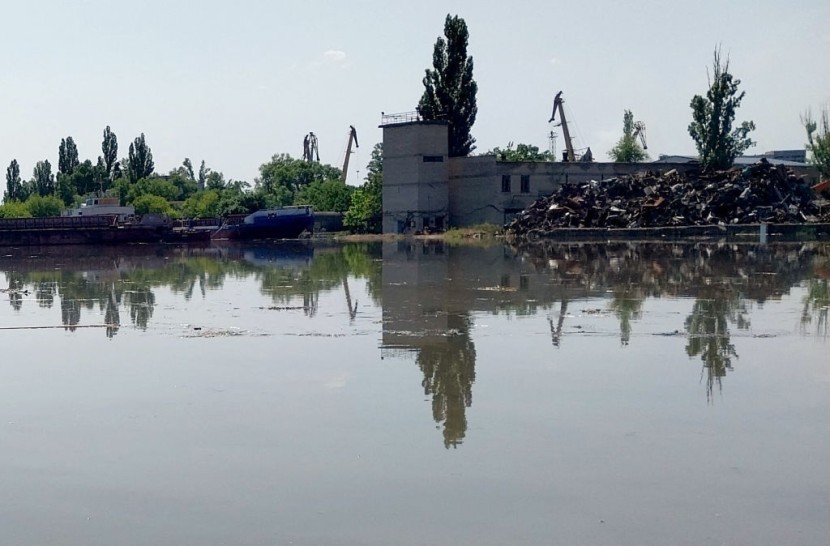
Millions of liters of water leaked through a gaping breach in a Russian-controlled dam, flooding a swath of the conflict zone in southern Ukraine, endangering dozens of villages, and severing water supplies.
Ukrainian and Russian forces placed responsibility for the violation on each other. The Nova Kakhovka dam, which contains as much water as the Great Salt Lake in the US state of Utah, provides water to the Crimean peninsula, which Russia annexed in 2014, and to the Zaporizhzhia nuclear power facility, which is also under Russian control.
Ukraine Dam Attack
The International Atomic Energy Agency, the United Nations' nuclear overseer, stated on Twitter that it was closely monitoring the situation but that there was "no imminent nuclear safety risk at (the) facility," which is also located in southern Ukraine.
However, Ukraine's state atomic power agency Energoatom reported that the Kakhovka Reservoir was swiftly losing water, posing an "additional hazard" to Europe's largest nuclear power plant, as per Reuters.
Approximately 22,000 people residing in 14 localities in the southern Kherson region of Ukraine are at risk of flooding, the Moscow-appointed chief of the region was quoted as saying by Russia's RIA news agency.
Per BBC, Ukrainian President Volodymyr Zelensky stated that the attack on the Nova Kakhovka dam demonstrates that Russian troops "must be expelled from every inch of Ukrainian territory."
"Terrorists will not be able to stop Ukraine with water, missiles, or anything else," Zelensky wrote on Telegram. Despite the damage, all services are still operational, according to Zelensky, who also urges anyone reading his update to "spread only official and verified information."
Charles Michel, president of the European Council, is "shocked" by the unprecedented attack on the dam in the Kherson region. Michel accuses Russia for the attack and declares that the EU council will hold Moscow accountable for its actions.
Ukraine has accused Russia of carrying out the attack in the Moscow-occupied town of Novo Kakhova, while the Moscow-appointed mayor has blamed Ukraine.
Video Shows Kakhovka Dam Blown Up
Russia asserted that the Ukrainian military was responsible for the destruction of the Nova Kachahovka Dam. The two parties could not even concur on the severity of the regional threat, according to CBS News. A Moscow-appointed local official stated on Tuesday that there was "no concern" of significant population centers being flooded.
However, Ukrainian officials have warned that the breach could have far-reaching effects, including the flooding of homes, streets, and businesses downstream, the depletion of water levels upstream that help cool Europe's largest nuclear power plant, and the depletion of drinking water supplies for the Crimean peninsula's south, which Russia illegally annexed in 2014.
The breach of the dam added a complex new element to Russia's ongoing war in Ukraine, which is now in its sixteenth month, as Ukrainian forces were widely perceived to be advancing with a long-awaited counteroffensive along more than 1,000 miles of front line in the country's east and south.
Moscow-controlled authorities in the region claimed the dam was partially devastated by "multiple attacks" launched by Ukrainian forces during the night, resulting in a "uncontrollable" flow of water. Online videos began to testify to the breach. One depicted floodwaters inundating a long roadway, while the other depicted a beaver fleeing to higher ground due to rising water levels.
Ukrainian authorities have long warned that the dam's failure could release 4.8 billion gallons of water and flood the southern Kherson region and dozens of other areas where hundreds of thousands of people live, as well as threaten a meltdown at a nuclear power plant 93 miles away that is occupied by Russia.
Former Ukrainian Prime Minister Arseniy Yatsenyuk, who appeared live on the BBC Tuesday morning, stated that 16,000 people were ordered to evacuate towns and villages in the dam's immediate danger zone.
The state atomic agency of Ukraine said the dam's devastation posed a threat to the nuclear power facility but that the situation was under control. The International Atomic Energy Association tweeted that the plant posed "no imminent nuclear safety concern."
The Kakhovka dam holds back an extensive reservoir that provides water to a number of communities upstream, so it could have an impact on the water supplies of those communities. It also provides cooling water to the Zaporizhzhia nuclear power station, Europe's largest, approximately 100 miles (160 kilometers) upstream, which is under Russian control and is dependent on the reservoir.
It was constructed during the Soviet era and is one of six dams that lie along the Dnipro river, which flows from the extreme north of the nation to the south coast.
Related Article : Russia Claims It Repelled Large-Scale Ukraine Attack, Kills Hundreds








